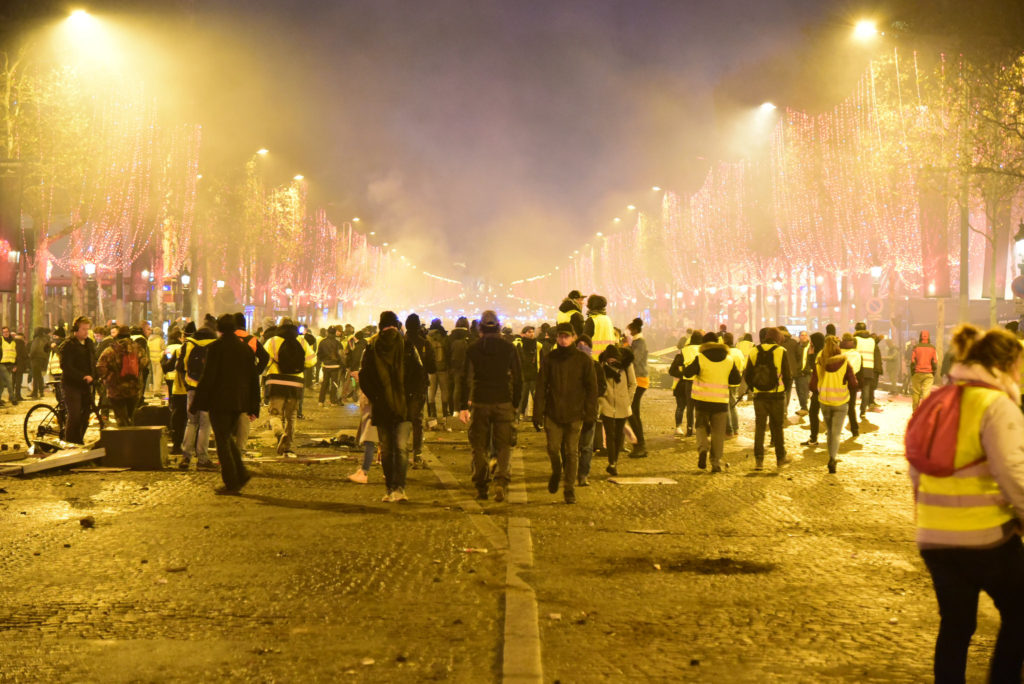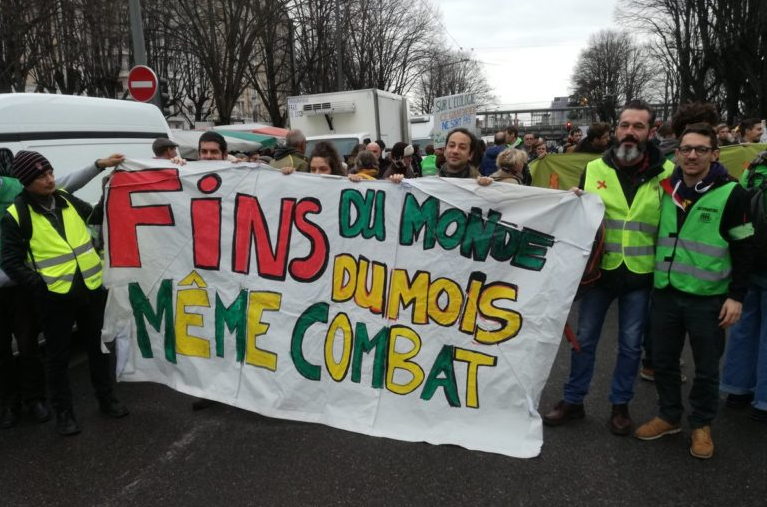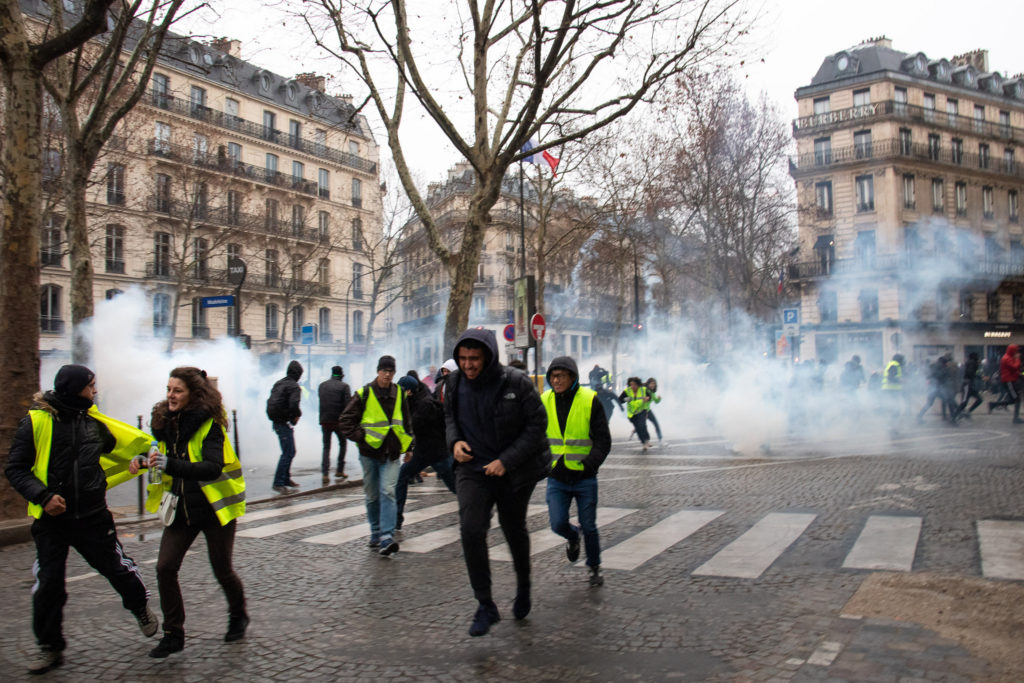The yellow vest movement shows us the potential of a “convergence des luttes” to demand a just ecological transition
Saturday 8 December 2018 is a day that will likely go down in history for many social movements. The streets of many European cities were filled with demonstrations against the most pressing social issues of our time: growing inequality, useless mega infrastructural projects, and climate breakdown. While these issues may seem unrelated, they have common origins in neoliberalism.
The demonstrations that most captured the collective imaginary and the headlines are those of the gilets jaunes – or ‘yellow vests’ – in France. The past five weekends have seen protests rising against Macron’s government. Although the movement was sparked by a new tax on petrol, the ‘fuel’ keeping the movement alive is resentment towards ‘the President of the rich’ who recently reduced the solidarity tax on wealth, an iconic policy of French socialism.
Other notable resistance protests marking that weekend include those in Italy against the ‘useless mega infrastructural projects’ such as the TAV, TAP and the MUOS military antenna – major proposals of private industrial infrastructure that devastate ecosystems and the health of citizens. The TAV is an example of how transport becomes a threat to ecology and society when privatized rather than run as a public service. The TAV is the result of a historic wave of the neoliberalization of transport, energy and telecommunications industries, through the privatization and deregulation of publicly-owned enterprises.
The Gilets Jaunes (“Yellow Jackets”) taking over the Champs-Elysées, Paris. Photo: Christophe Becker on Flickr
At the same moment, international policy-makers convened in Katowice, Poland to negotiate how to implement the Paris Agreement at the COP24 UN climate conference. Or, in the case of some parties, such as the US, Russia, Kuwait, and Saudi Arabia, the conference was about negotiating how not to implement the Paris Agreement. For delegates of poorer nations and small island states in the Pacific that are on the frontlines of climate change, the objective was to negotiate their own survival. This year could be the last opportunity for international policy-makers to take the necessary measures to avoid climate apocalypse. The result has been an unprecedented wave of climate marches in recent weekends, including the biggest some countries have ever seen.
It is therefore evident that ecological issues are an ever-stronger underlining force for many social movements. Ironically, it is precisely in France – whose President was recently recognized as a UN “Champion of the Earth” – where it has become evident how the neoliberal establishment privileges the wealthy through climate policy while neglecting the working class.
As human ecologist Andreas Malm argues, Macron is today the champion of neoliberal rhetoric on climate change in upholding the tenet that all individuals are indiscriminately responsible for climate change and must be encouraged to consume sustainably through the imposition of value-added taxes (VAT). Such is the logic behind the fuel tax initially proposed by the French government. However, an increase in VAT is the most regressive way to drive the ecological transition we need. This is because the tax assumes that purchasing power is equal for all citizens. The real impact of the tax would be felt in the wallets of the poorest citizens who cannot afford to abandon their old vehicles – their only lifeline to access work and services in rural areas where public transport is sorely lacking. Meanwhile, overall C02 emissions would remain substantially unchanged since the wealthy can afford the tax and the poor have no other transport option but to keep driving.
Police firing tear-gas on protestors in Paris. Photo: Olivier Ortelpa on Flickr
This is why the streets of Paris have been ringing with the chant “The end of the world and the end of the month, same perpetrators, same struggle”. In response to the protests, Naomi Klein tweeted, “Neoliberal climate action passes on the costs to working people, offers them no better jobs or services + lets big polluters off the hook. People see it as a class war, because it is.” As an example of how taxes should target the big polluters, we need only consider aviation transport in France. While the car is the most widespread means of transport among all social classes, 75% of French people never fly and half of the total domestic flights in France are made by just 2% of the population, presumably the upper classes. Yet kerosene, the fuel used for commercial airliners, is not taxed. Higher taxes on kerosene would be a way to reduce emissions quickly and more fairly.
The climate crisis has its roots in the rapid accumulation of capital wealth associated with burning fossil fuels like there’s no tomorrow. Continued centralization of decision-making within a neoliberal order can only offer solutions such as the construction of new pipelines for natural gas, the TAV, and the fuel tax. Instead, the ecological transition must also be a social transition, and a quick one at that. The IPCC special report on 1.5°C warming warns us we must halve global emissions in the next 12 years and reduce them to zero by the middle of the century.
TAV street protests in Turin, Italy. Photo: EYE DJ on Flickr
Maybe we can give Macron some hints in the right direction. To ensure mobility and energy access in times of transition, we must return them to public oversight with devoted resources commensurate to the urgency of climate breakdown. This requires a massive expansion of affordable public transport in the urban, semi-urban periphery, and rural areas, with support of alternative forms of transport, such as bicycles and electric carpooling. We must also bring the electrical grid under democratic control through nationalization, or still better municipalization, to encourage the supply of renewable, locally-managed energy sources. Preferably, this public management would be coupled with advances in participatory democracy at the municipal level. A great example is Barcelona Energía, the city’s new publicly owned grid of renewable energy soon to supply 20,000 homes, implemented under the municipalist politics of Barcelona en Comú.
It would be useful if the automotive industry was ordered to transform its industrial production for what we need: wind turbines, solar panels, electric bicycles, trams, etc. Just as the American automobile factories were converted to churn out tanks in World War II by order of the Roosevelt administration, so today they could be converted to supply the technology needed for a renewable energy transition.
More and more progressives around the world – from Corbyn to Sanders – are already following Roosevelt’s footsteps by calling for a Green New Deal, as a government led investment in low-carbon infrastructure, providing training and employment so that the energy transition simultaneously tackles income inequality. To finance this new era of large public investments, we need more progressive taxation since a close correlation exists between wealth and quantity of emissions. This will be necessary to take back the private wealth accumulated in recent decades to avoid the socio-economic and ecological collapse that climate change guarantees.
But these issues won’t be a priority for the European ruling class, unless the people force a change in the agenda of the ruling class. Another important lesson of the past few weeks is that any progress on the climate front will only come from public pressure. This does not refer only to street demonstrations, but acts of civil disobedience like those carried out in central London in November by the Extinction Rebellion movement. As long as Macron or other European leaders of the current neoliberal ruling class are unwilling to implement the measures required for system change, mass direct action must continue to demand it. A convergence des luttes is essential for shaping a common vision and catalyzing political action.
Teaser photo credit: “End of the world, end of the month, same struggle. Photo: Il Est Encore Temps on Twitter







